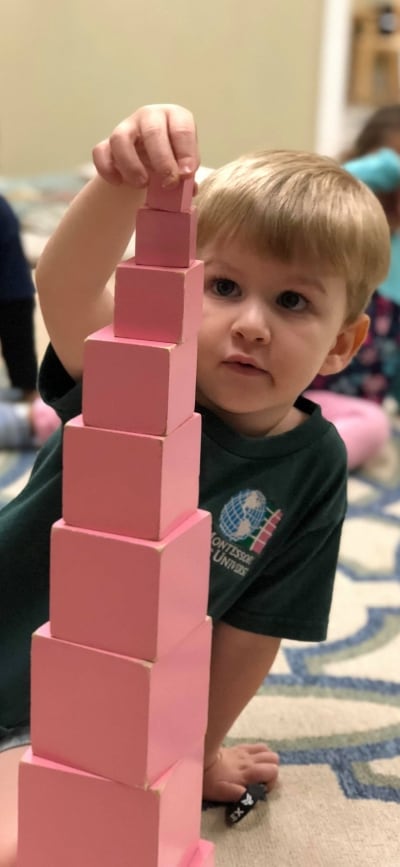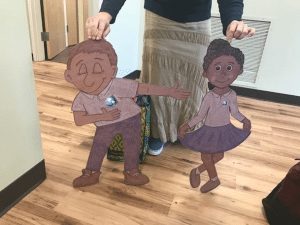
Continuous Reinforcement is the Key to Success
The Montessori educational experience focuses on creating an intellectually engaging environment for our children. Children take part in a variety of activities that enable them to learn the basics, such as shapes, colors and numbers, as well as more complex skills such as increasing their vocabularies. Children also learn team-building skills and independence. However, by doing continuous reinforcement, in order to gain the most out of the Montessori experience, there are several simple activities that you as a parent can do at home with your child, in order to further their Montessori education. By doing continuous reinforcement with your children
Sorting at Montessori : At our pre-school children do sorting activities that help them in learning their colors and shades by using color tablets. With the color tablets, the children sort their primary and secondary colors. They also use blocks sorting them by colors and shapes (triangles, squares, and rectangles). During these sorting exercises, children are putting their observation skills to the test.
Sorting at home: Parents can work to reinforce their child’s sorting skills by practicing simple sorting exercises with their children at home. Parents can set out blocks, legos, or big beads, and then have their children sort them by colors and sizes. Using plastic molds to practice sorting is also a good strategy.
Reading at Montessori: An integral part of the Montessori curriculum is storytime sessions, which aim to promote an active imagination, as well as increase the child’s vocabulary and literary skills. Listening to the teacher read can also enhance the child’s communication skills.
Reading at home: Parents can do story sessions with their child at home before they go to sleep each night. This nightly routine creates a special bonding moment with your child. It also helps the child become more open-minded. According to an article entitled “The Importance of Reading To Your Children” from hopkinsallchildrens.org, “Reading to your child helps to expose them to all types of subjects and concepts, building your child’s understanding of humanity and the world around them.”
Circle time at Montessori: During circle time, our children sit themselves on the floor while they sing along to songs that aim to reinforce concepts from the days of the week, to the months of the year, and much more. During the song, the children sing along and repeat the words spoken by the teacher. This allows the children to not only retain information but enhance their communication skills as well.
Circle time at home: Parents can do this at home by simply sitting their child down on the couch, or carpet, and having them repeat the days of the week, plus the months of the year at least two times in a row. By reinforcing this Montessori activity, your child will begin to quickly absorb and retain this information.
Teamwork at Montessori: The Montessori curriculum takes great care to reinforce teamwork and team-building skills into our children. According to an article on care.com, entitled “15 Team-Building Activities for Kids”, “Teamwork games enhance listening skills and demonstrate how each member of a team brings a unique set of experiences, skills, and knowledge to a collaborative process”. To put it simply, teamwork is essential in the retention and presentation of knowledge.
Teamwork at home: Parents can continue to build their children’s teamwork skills at home by creating play dates, whether with friends or siblings, and having them choose an activity to work on. It can be anything from a puzzle, sorting, artwork, building, or helping to prepare a meal. We recommend the activity to be challenging, collaborative, and fun.
Independence exercises at Montessori: The promotion of independence is an essential part of a Montessori education. Children can practice and demonstrate independence by locating their own cubbies, putting their own belongings away, or helping to do small tasks around the classroom. The children also choose their own work to do, which consist of building, sorting, or reading exercises that they can do while sitting a table, floor, or using their mats.
Independence exercises at home: Parents can continue to build their children’s independence at home by giving them puzzles or simple math based activities to work on. Parents can also give the children new assignments to do at home, such as organizing their room, folding laundry, sweeping the house floors, helping their parents bring food to the table during meal times, or helping their parents put items away throughout the house. Through tackling these problems independently, children are able to build essential problem-solving skills that aid in their personal growth and development.
In an article entitled “Why It’s Important To Let Your Child Make Mistakes” the author finds that “Letting your child try and try again- and eventually get it right on her own- teaches her more about herself, and about life, than rushing in to save the day. You can still be her hero, but let her be her own hero too.” Through independence, children are able to grow.
We believe that a preschool should be an intuitive and interactive learning environment that is designed to allow children to explore and become curious and independent problem solvers and learners, which is why Montessori Kids Universe places independent learning strategies at the forefront of our education focus.
Sources


